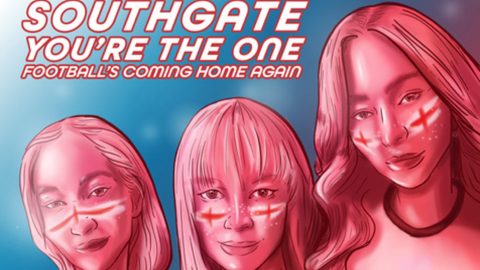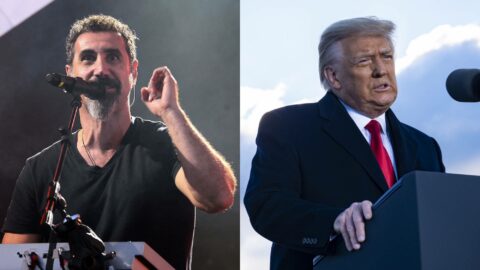
Outside of becoming the mistress or close family member of a cabinet member and ticking a box marked, ‘Yeah – I’ll knock you together some PPE from somewhere, whatever’, it’s pretty tough to earn yourself $100,000 a day. Yet that’s the eye-watering amount that Queen have reportedly been earning from their 2018 biopic Bohemian Rhapsody, the sort of money that even Amazon might think twice about trying to reroute via Vanuatu for tax purposes.
It must be frustrating for newer acts to watch the serious money being made by the ancients; those selling stories of lavish rock’n’roll Valhalla. Today’s musicians couldn’t dream of being able to afford the sort of largesse and extravagance that make for watchable biopics. Developing a serious drug addiction that you can then overcome via luxury rehab in the final reel? It’s way beyond most acts’ budgets, and you can forget waiters with bowls of cocaine strapped to them at album launch parties. Most labels these days could barely stretch to Josh Widdecombe passing round a family bag of Revels.
The best chance most new acts have of earning themselves a biopic in a few decades’ time is by dying young, and that approach tends to bear mixed results in helping you cash in in your 70s. So the only hope is to build yourself a legendary catalogue and hope that history does the rest. And to do that, even in 2021, you clearly need to be making albums.
You can feel Raye’s pain. Last week, the London singer took to Twitter to complain that her label, Polydor, had stopped her releasing a debut solo album since she signed a four-record deal with them in 2014. “I have had albums on albums of music sat in folders collecting dust,” she wrote, claiming that the label was withholding money to record a full album until recent lead single ‘Call On Me’ does well enough to justify the move. She added that she has “songs I am now giving away to A list artists because I am still awaiting confirmation that I am good enough to release an album…I’m sick of being slept on and I’m sick of being in pain about it.”
Let’s be clear: nobody has stopped you hearing Raye’s music. She’s released a mini-album (last year’s ‘Euphoric Sad Songs’), five EPs and 16 single tracks in the seven years she’s been signed, including two UK Top 10 songs and several US dance hits. Not to mention dozens of guest appearances and writing credits with the likes of Jonas Blue, Charli XCX, Nas and David Guetta.
Theoretically, this should work in Raye’s favour: she’s had seven years of promotional groundwork out of Polydor and still has four albums written into her contract. She’s built relationships and a reputation within the mainstream songwriting community that could find her penning major hits for decades, should the notoriously fickle pop audience lose interest in her during the Great Adele Blackout of 2022.
But, essentially, Raye is an artist, and as such she’s become a victim of the modern industry’s Test The Water approach. Since it’s relatively cheap and easy to keep releasing tracks to build a name for a new signing, the standard debut album plan consists of bombarding listeners with enough tracks that some of it sticks, then cobbling together an album from the most popular tunes ‘when the market’s ready’.
It works for the labels, who can use the process to take fewer risks with new acts, more easily cut their losses and even carefully guide them down any trend path they chose using streaming figures as a riding crop: “The Katherine Jenkins duet didn’t do the numbers but the Cardi B feature broke the internet, so maybe start an OnlyFans and we’ll get you a sync on the next Dogging Tales…”
It’s great for the streaming services too, since they’re basically just a tapeworm in the bowels of pop stardom, growing fat on a ceaseless, watery torrent of half-formed, half-digested ‘content’. But if you happen to be an artist with ambitions of widespread respect and a long-term future in music – not to mention a vision – you still want to explore it within the freedoms of the 45-minute format. Raye’s mini-album was thematically unified, following the seven stages of grief, so she clearly has broader stories to tell than can be dreamt of in your three-minute Stefflon Don collab. In internet-speak: she’s a meme-maker dreaming of her Citizen Kane, or a clickbait compiler holding in a classic novel.
Has there been greater proof that, like a sonic Michael Myers, the album will never die? It’s been robbed of its real-life outlets, all but stripped of its physical form and flayed alive on digital platforms for anyone to feast freely on its innards. And yet, the best part of a decade into the dominance of track-based streaming, even contemporary mainstream acts are crying out to express themselves longform. If an act really wants notice, respect, significance and acclaim – even as sales of album bundles dwindle – their best bet is still to mark out their fans’ lives, and their own evolutions, in an immersive way.
Take it from someone still bearing the emotional scars of speed-dating: you don’t make a lifetime’s bond by barking all your insecurities at someone for three minutes. Even in Auto-Tune. So come on, Polydor: let Raye release her album – the market is ready. And after all, the very least a label should give their artists in 2021 is a shot at a biopic.
The post Raye’s plight proves that the major label system is broken appeared first on NME.









